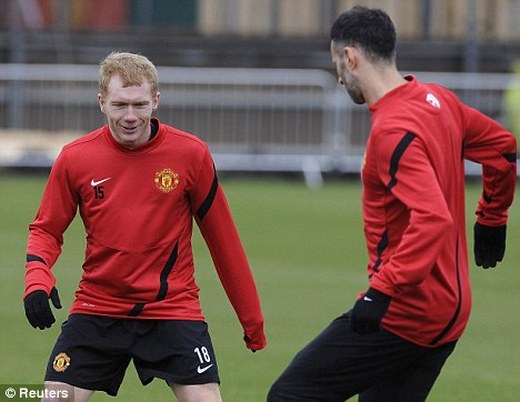News
Neville: Giggs and Scholes show the older players how to manage their careers

Something interesting has happened over the last 10 years in the Premier League. Players who once would have been discarded as expensive and too old have become important parts of title-winning squads.
In fact, the ideal Premier League squad these days would have about eight players under the age of 23, about 12 between 23 and 31, and four or five up to 38.
Five years ago at Manchester United, we were given a presentation about the famous Milan lab at AC Milan, where, with good sports science and healthier lifestyles, they have kept players well into their Thirties.
They showed us the likes of Alessandro Costacurta, who was 40 at the time, Cafu, who was 36, Serginho, 35, and Paolo Maldini, 38, all of whom were still playing. United’s vision was to keep outfield players playing into their late Thirties, almost unheard of 20 years ago.
Essentially, there are three cycles to your career. When you’re young, you’re in and out of the team. Then, between 21-30, you’re the king, one of the core group of five or six players who start every week.
But if you play every Wednesday and Saturday and every tournament in the summer between the ages of 21-30, it’s an absolute fact that you’re going to fall off the cliff at 32. The injuries will start to come and your recovery from games won’t be quite the same.
It’s key at that moment that two things happen. First, you recognise the change physically and start to look after yourself better. And, second, mentally you accept that you’re no longer going to be ‘the man’.
I was reminded of that when I was in Naples last week, watching Chelsea in the Champions League, where the manager Andre Villas-Boas dropped Frank Lampard, Michael Essien and Ashley Cole.
And with the amount of discontent there appears to be at the club, with stories being leaked and the manager admitting players challenged him about selection, it almost seems as though there are some players at Chelsea who aren’t accepting that change is happening to them.
Because I can see it physically in them. They are not what they were four or five years ago. But if they can just accept that change — and, if they were better managed and the manager explained to them their new role and made them feel a part of it — they could have careers at Chelsea until they are 37 or 38.
Take Jamie Carragher at Liverpool. People might look at him and say: ‘He must be furious to be sidelined at the age of 34.’ But actually he can sit back, relax. Let the two lads who are playing well carry on.
Contribute when you can because you will be needed. If you can accept that the bulk of your war on the front line is over, then you can go back behind the lines and become a general. It is players such as Carragher who will set the tone in the dressing room, impose discipline and provide advice and encouragement to young players when they need it.
Young players need guidance, and if you look at the likes of Juan Mata, Daniel Sturridge, David Luiz and Gary Cahill at Chelsea, you wonder whether that guidance is available to them.
It seems as though there is a battle of personalities going on rather than an acceptance from Villas-Boas that these players are important and a recognition from the players that their role has changed.
There is a solution that can work for everyone. It doesn’t need to be a battle. And today we must recognise the best example of all in Ryan Giggs, ready to play his 900th competitive game at the top level today at the age of 38.
On Thursday night, the camera panned to him just after Danny Welbeck was brought on against Ajax and it was clear he wouldn’t be needed for the night. He had his feet up, quite relaxed, without a care in the world, ready for the Norwich game today. There would have been no showdown with the manager or stories in the press about how he had been snubbed.
Paul Scholes is in the same mould.
If you look at Arsenal’s spell without trophies, which will be seven years at the end of the season, you could argue that Arsene Wenger discarded players such as Patrick Vieira and Robert Pires too quickly.
With players of that stature in the dressing room and on the pitch in big games, his teams might have had more mental strength about them. They might not have been able to reproduce the form of old all the time but they still could have made a difference.
Rio Ferdinand is just hitting that phase of his career. Maybe you’re seeing signs of it with Steven Gerrard, with the injuries he has had. It will happen to Wayne Rooney in three or four years. But they all still have important contributions to make.
If you’re 32 and get dropped, don’t get wound up about it. Chill out, relax. You fought your war. Just go and fight the battles you need to fight.
Because what is the alternative if you don’t accept you’re no longer top dog? Going off to China or to the furthest reaches of Russia to play for Anzhi? Or ending up at a mid-table Premier League club?
Far better to manage your expectations, stay at a great club and become a great leader in a team that can still win trophies.
Medals matter
Charlie Adam was interviewed before the Carling Cup final and stated that medals don’t define your career. While that may be the case at other clubs, I’m sure Kenny Dalglish will explain to him that’s not how it works at Liverpool.
If it isn’t medals that define your career, I don’t know what does. The best nights of your life as a player are the ones after winning a trophy. And for Kenny and Liverpool, today’s final is a big moment.
Nothing improves your confidence and brings a team together more than winning a cup. This would be Liverpool’s first trophy for almost six years. Andy Carroll, Jordan Henderson and Jose Enrique have the chance to win their first honour and for Adam, Luis Suarez, Dirk Kuyt, Martin Skrtel and Daniel Agger, it would be their first trophy in England.
There can be a sting in the tale, however, as losing can destroy confidence and spirit. Just look at Arsenal’s year since that shock loss by Birmingham in this final last season. That should serve as a warning to Liverpool.
Defensive let down
Premier League sides have let themselves down in the Champions League this season and we might not have a representative in the quarter-finals for the first time since 1996.
One year’s poor form remains a blip but if it happens next year, you can say it’s a trend. Our league is the most competitive in the world but English clubs might continue to suffer unless we see a return to proper defensive standards.
Poor defending cost Arsenal and Chelsea against Milan and Napoli and you saw it again with Manchester United against Ajax in the Europa League.
We have to get back to defending properly, which means closing people down and marking tightly, if England is to regain its top-nation status in the Champions League.


